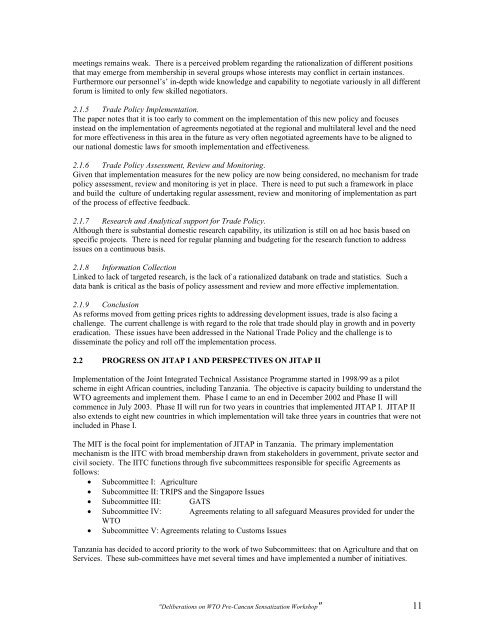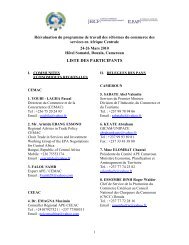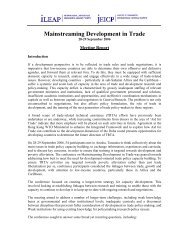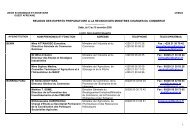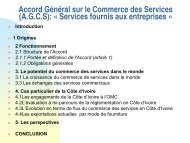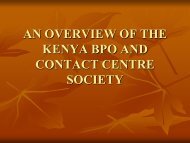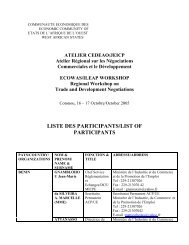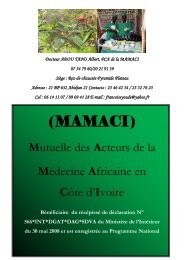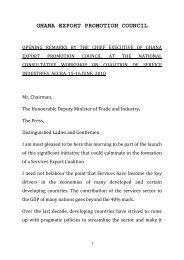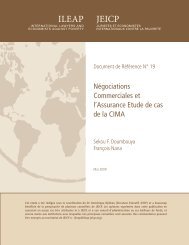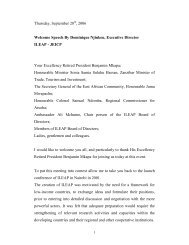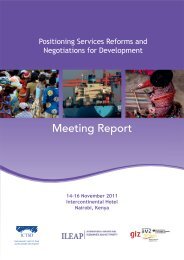Tanzania Report, Dar-Es-Salaam, Tanzania - ILEAP
Tanzania Report, Dar-Es-Salaam, Tanzania - ILEAP
Tanzania Report, Dar-Es-Salaam, Tanzania - ILEAP
You also want an ePaper? Increase the reach of your titles
YUMPU automatically turns print PDFs into web optimized ePapers that Google loves.
meetings remains weak. There is a perceived problem regarding the rationalization of different positionsthat may emerge from membership in several groups whose interests may conflict in certain instances.Furthermore our personnel’s’ in-depth wide knowledge and capability to negotiate variously in all differentforum is limited to only few skilled negotiators.2.1.5 Trade Policy Implementation.The paper notes that it is too early to comment on the implementation of this new policy and focusesinstead on the implementation of agreements negotiated at the regional and multilateral level and the needfor more effectiveness in this area in the future as very often negotiated agreements have to be aligned toour national domestic laws for smooth implementation and effectiveness.2.1.6 Trade Policy Assessment, Review and Monitoring.Given that implementation measures for the new policy are now being considered, no mechanism for tradepolicy assessment, review and monitoring is yet in place. There is need to put such a framework in placeand build the culture of undertaking regular assessment, review and monitoring of implementation as partof the process of effective feedback.2.1.7 Research and Analytical support for Trade Policy.Although there is substantial domestic research capability, its utilization is still on ad hoc basis based onspecific projects. There is need for regular planning and budgeting for the research function to addressissues on a continuous basis.2.1.8 Information CollectionLinked to lack of targeted research, is the lack of a rationalized databank on trade and statistics. Such adata bank is critical as the basis of policy assessment and review and more effective implementation.2.1.9 ConclusionAs reforms moved from getting prices rights to addressing development issues, trade is also facing achallenge. The current challenge is with regard to the role that trade should play in growth and in povertyeradication. These issues have been addressed in the National Trade Policy and the challenge is todisseminate the policy and roll off the implementation process.2.2 PROGRESS ON JITAP I AND PERSPECTIVES ON JITAP IIImplementation of the Joint Integrated Technical Assistance Programme started in 1998/99 as a pilotscheme in eight African countries, including <strong>Tanzania</strong>. The objective is capacity building to understand theWTO agreements and implement them. Phase I came to an end in December 2002 and Phase II willcommence in July 2003. Phase II will run for two years in countries that implemented JITAP I. JITAP IIalso extends to eight new countries in which implementation will take three years in countries that were notincluded in Phase I.The MIT is the focal point for implementation of JITAP in <strong>Tanzania</strong>. The primary implementationmechanism is the IITC with broad membership drawn from stakeholders in government, private sector andcivil society. The IITC functions through five subcommittees responsible for specific Agreements asfollows:• Subcommittee I: Agriculture• Subcommittee II: TRIPS and the Singapore Issues• Subcommittee III: GATS• Subcommittee IV: Agreements relating to all safeguard Measures provided for under theWTO• Subcommittee V: Agreements relating to Customs Issues<strong>Tanzania</strong> has decided to accord priority to the work of two Subcommittees: that on Agriculture and that onServices. These sub-committees have met several times and have implemented a number of initiatives."Deliberations on WTO Pre-Cancun Sensatization Workshop" 11


